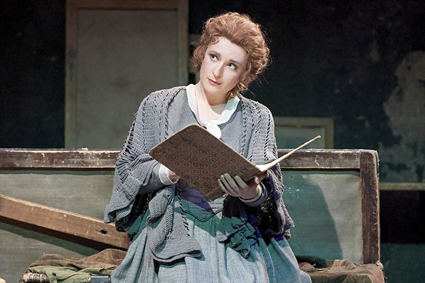| Opera Reviews | 7 May 2024 |
A somewhat erratic Bohème revivalby Moore Parker |
|
| Puccini: La bohème
Vienna State Opera 4 April 2019 |
|

Olga Bezsmertna (Mimi)
|
|
|
Still guaranteeing capacity houses, Zeffirelli and Escoffier’s opulent 1963 La bohème remains one the Vienna State Opera’s stalwart milestones, while affording a comfortable vehicle for a vocal focus to newcomers within its relatively undemanding staging. However, if a single term were demanded for this revival, it could only be listed as erratic. Singing his first Rodolfo in Vienna, Bryan Hymel (who debuted here as Pinkerton in Madam Butterfly five years ago) returns in a line-up of more familiar regulars to the house - several of whom are valued ensemble members. Hymel, with his bright and generous lyric tenor, brings a pleasing guy-next-door attitude to the role - well blending with the other lads in the garret and playing a credible - if not the most individual - suitor. Vocally he began a touch precariously (perhaps nervous, but unannounced as indisposed), with phonation interrupted by slight blips and with several tenuous upper notes in his opening scene. "Che gelida manina" was delivered more with competence than flair - with the phrase to the exposed climax clumsily broken with one breath before “la”, and a second before “speranza”. The resulting applause was firstly hesitant, then muted. "O soave fanciulla" saw both soprano and tenor closing with the optional C - but with both under uncomfortable pressure. The Cafe Momus scene was really rather perfunctory and lacked any sense of abandon or passion - in no small part due to a distinctly non-Italianate flavour to the evening, and in Hymel’s case specifically, through mundane delivery in lines which call for luscious warmth and lyricism, both in tone and in shape. Acts 3 and 4 found both Hymel’s instrument and portrayal settling, while slightly marred by his prevailing habit of over-extending the final notes of phrases. In all, I suspect, not one of the celebrated tenor’s finest evenings since his last appearance here. In her first Mimi in the house, Olga Bezsmertna’s reading was also spiked with fine moments, but was straightjacketed by being too sick too soon - and thus thwarting any credible sense of romance. Acts 1 and 2 lacked the variety as well as dramatic and vocal presence to properly counterbalance the character’s decline and demise - whereby (in keeping with Hymel) the work’s second half proved the more successful, with Bezsmertna spinning a touching "Donde lieta usci", and securing a well-rounded closing quartet in Act 3. This was a Mimi who won through her restrained pianissimi rather than in the role’s grander vocal demands, with her appealing lyric soprano (augmented by an exceptional breath control) yet a shade under-powered to be ideal. A particularly fragile and effective finale rounded-off a competent - if not stellar - first reading. Delightfully pert and petite in stature, Maria Nazarova’s first Musetta in the house sparkled with effervescence - sailing through the part with relative ease, while bringing a decent portion of sentiment and pathos to the evening’s closing scene. Boaz Daniel’s Marcello found this fine baritone in good form, and serving as a solid catalyst for the remaining three leads. In a role that can easily recede into the shadows, Manuel Walser confirmed Schaunard’s significance in his appealingly bold and energetic showing, while Ryan Speedo Green scored a hit with an outstanding Colline - full of character, wit, and dexterity, and delivering a "Vecchia zimmara, senti" with faultless line and equanimity. Wolfgang Bankl (doubling as Benôit and Alcindoro) brought an unusually strong contrast to both roles, impacting with his fruity bass-baritone and nailing both characters with classy understatement. He brought down Act 2’s curtain with aplomb by toppling his chair backwards after receiving Musetta’s two bills. In the pit, Ramón Tebar enjoyed a taught and well-coordinated first Act, with cues sufficiently bold to be seen by the porter at the Hotel Sacher, but - oddly - balance and coordination thereafter unravelled to an unhappy degree, negatively impacting an otherwise well-intended reading which was generous in verve, detail, and dramatic impact.
|
|
| Text ©
Moore Parker Photo © Wiener Staatsoper / Michael Pöhn |
|







